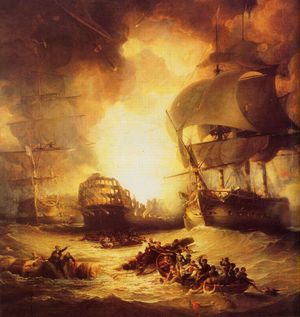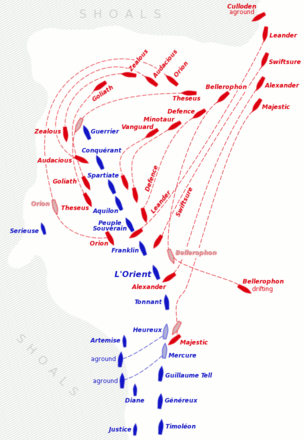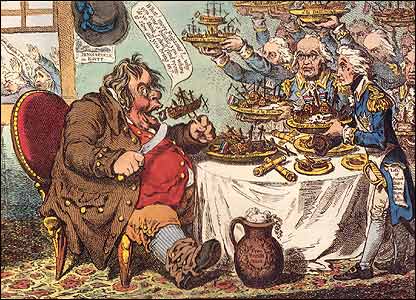August 01, 2007
Gratuitous Royal Navy Geekery Posting

Destruction of the 120-gun French flagship L'Orient
"Victory is not a name strong enough for such a scene."
- Nelson
Today is the anniversary of the Battle of the Nile, fought in 1798, in which Rear-Admiral Horatio Nelson and a fleet of 14 ships ran to ground the 15 ship French fleet under Francois-Paul Brueys d'Aigalliers, Comte de Brueys, in Aboukir Bay near the mouth of the Nile.
As evening descended, Brueys anchored his ships in line near the western shore of the bay, confident that Nelson would not dare attack until morning and even then, would only be able to do so from seaward. Nelson confounded Brueys' plans by coming on in spite of night having fallen and then, realising Brueys had anchored his fleet too far out, splitting his force so as to envelop the French from both sides:

(Image lifted from Wikipedia.)
Caught between the hammer and the anvil, the French were utterly crushed, with only two ships of the line and two frigates managing to escape.
The French fleet had been at Aboukir in support of Napoleon's invasion of Egypt (which was intended as a stepping off point for a march on India). With the loss of his sea link, Napoleon's army was left stranded while he himself suddenly remembered an urgent appointment back in Paris.
The battle had enormous repercussions. Aside from the actual physical destruction of an immense amount of French war material, it removed the threat to British India. In addition it bolstered the already rising reputation of Nelson and, more generally, fueled the increasing sense of British domination of the sea, as illustrated in this cartoon of the time by James Gillray of John Bull (the Brit equivalent of Uncle Sam) lunching on French warships, courtesy of His Majesty's Navy. (Note the face of that rat-bastard Charles James Fox in the window on the left, as he flees in consternation over the Navy's successes.)

This sense of dominance was felt on both sides of the Channel and was to fuel British aggressiveness and French hesitancy at sea for many years to come.
The spectacular destruction of L'Orient pictured above was one of the climaxes of the battle. She had caught fire during the engagement. When the fire reached her powder magazine, she blew to smithereens. Needless to say, most of her crew were killed as well, including her Captain, Luc-Julien-Joseph Casabianca, and his son. This incident inspired the poem "Casabianca" by Felicia Dorothea Hemans (1793-1835):
THE boy stood on the burning deck
Whence all but him had fled;
The flame that lit the battle's wreck
Shone round him o'er the dead.
Yet beautiful and bright he stood,
As born to rule the storm;
A creature of heroic blood,
A proud, though childlike form.The flames rolled on -- he would not go
Without his father's word;
That father, faint in death below,
His voice no longer heard.He called aloud -- "Say, father, say,
If yet my task is done?"
He knew not that the chieftain lay
Unconscious of his son."Speak, father!" once again he cried,
"If I may yet be gone!"
And but the booming shots replied,
And fast the flames rolled on.Upon his brow he felt their breath,
And in his waving hair,
And looked from that lone post of death
In still, yet brave despair.And shouted but once more aloud,
"My father! must I stay?"
While o'er him fast, through sail and shroud,
The wreathing fires made way.They wrapt the ship in splendor wild,
They caught the flag on high,
And streamed above the gallant child,
Like banners in the sky.There came a burst of thunder sound--
The boy -- oh! where was he?
Ask of the winds that far around
With fragments strewed the sea!--With mast, and helm, and pennon fair
That well had borne their part--
But the noblest thing that perished there
Was that young, faithful heart.
Patrick O'Brian fans will recall that young Lieutenant Jack Aubrey fought at the Nile, serving the guns in the lower deck "slaughterhouse" aboard the Leander as she broke the French line ahead of the Franklin.


 Image courtesy of the lovely and talented
Image courtesy of the lovely and talented 